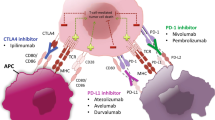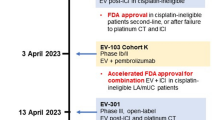Summary
Background This phase 1b study evaluated an enteric-coated tablet (ECT) formulation of the investigational Aurora A kinase inhibitor, alisertib (MLN8237). Methods Patients with advanced, non-hematologic malignancies received oral alisertib ECT for 7 d BID followed by 14 d treatment-free (21-day cycles; 3 + 3 dose escalation schema). Objectives were to assess safety, pharmacokinetics, and antitumor activity, and to define a recommended phase 2 dose (RP2D) of alisertib. Results 24 patients were treated. Median age was 57 years. Patients received a median of 2 cycles (range 1–12). The RP2D was determined as 50 mg BID for 7 d (21-day cycles). A cycle 1 dose-limiting toxicity of grade 4 febrile neutropenia was observed in 1 of 13 patients at RP2D. The most common drug-related adverse event (AE) was neutropenia (50 %). At doses ≥40 mg BID, 7 patients had drug-related AEs that were serious but largely reversible/manageable by dose reduction and supportive care, including 3 with febrile neutropenia. Pharmacokinetic data were available in 24 patients. Following administration of alisertib ECT, the plasma peak concentration of alisertib was achieved at ~3 h; systemic exposure increased with increasing dose over 10–60 mg BID. Mean t½ was ~21 h following multiple dosing. Renal clearance was negligible. Nine patients achieved stable disease (3.98*, 5.59, 1.28*, 2.56, 5.45*, 3.48, 3.15, 8.31, and 6.93* months; *censored). Conclusions Alisertib ECT was generally well tolerated in adults with advanced, non-hematologic malignancies. The RP2D is 50 mg BID for 7 d and is being evaluated in ongoing phase 2 studies.


Similar content being viewed by others
References
Bolanos-Garcia VM (2005) Aurora kinases. Int J Biochem Cell Biol 37:1572–1577
Barr AR, Gergely F (2007) Aurora-A: the maker and breaker of spindle poles. J Cell Sci 120:2987–2996
Carvajal RD, Tse A, Schwartz GK (2006) Aurora kinases: new targets for cancer therapy. Clin Cancer Res 12:6869–6975
Marumoto T, Honda S, Hara T, Nitta M, Hirota T, Kohmura E, Saya H (2003) Aurora-A kinase maintains the fidelity of early and late mitotic events in HeLa cells. J Biol Chem 278:51786–51795
Huck JJ, Zhang M, McDonald A, Bowman D, Hoar KM, Stringer B, Ecsedy J, Manfredi MG, Hyer ML (2010) MLN8054, an inhibitor of Aurora A kinase, induces senescence in human tumor cells both in vitro and in vivo. Mol Cancer Res 8:373–384
Gorgun G, Calabrese E, Hideshima T, Ecsedy J, Perrone G, Mani M, Ikeda H, Bianchi G, Hu Y, Cirstea D, Santo L, Tai YT, Nahar S, Zheng M, Bandi M, Carrasco RD, Raje N, Munshi N, Richardson P, Anderson KC (2010) A novel Aurora-A kinase inhibitor MLN8237 induces cytotoxicity and cell-cycle arrest in multiple myeloma. Blood 115:5202–5213
Fu J, Bian M, Jiang Q, Zhang C (2007) Roles of Aurora kinases in mitosis and tumorigenesis. Mol Cancer Res 5:1–10
Nadler Y, Camp RL, Schwartz C, Rimm DL, Kluger HM, Kluger Y (2008) Expression of Aurora A (but not Aurora B) is predictive of survival in breast cancer. Clin Cancer Res 14:4455–4462
Ogawa E, Takenaka K, Katakura H, Adachi M, Otake Y, Toda Y, Kotani H, Manabe T, Wada H, Tanaka F (2008) Perimembrane Aurora-A expression is a significant prognostic factor in correlation with proliferative activity in non-small-cell lung cancer (NSCLC). Ann Surg Oncol 15:547–554
Mazumdar A, Henderson YC, El-Naggar AK, Sen S, Clayman GL (2009) Aurora kinase A inhibition and paclitaxel as targeted combination therapy for head and neck squamous cell carcinoma. Head Neck 31:625–634
Zhang XH, Rao M, Loprieato JA, Hong JA, Zhao M, Chen GZ, Humphries AE, Nguyen DM, Trepel JB, Yu X, Schrump DS (2008) Aurora A, Aurora B and survivin are novel targets of transcriptional regulation by histone deacetylase inhibitors in non-small cell lung cancer. Cancer Biol Ther 7:1388–1397
Hook KE, Garza SJ, Lira ME, Ching KA, Lee NV, Cao J, Yuan J, Ye J, Ozeck M, Shi ST, Zheng X, Rejto PA, Kan JL, Christensen JG, Pavlicek A (2012) An integrated genomic approach to identify predictive biomarkers of response to the aurora kinase inhibitor PF-03814735. Mol Cancer Ther 11:710–719
Hoque A, Carter J, Xia W, Hung MC, Sahin AA, Sen S, Lippman SM (2003) Loss of aurora A/STK15/BTAK overexpression correlates with transition of in situ to invasive ductal carcinoma of the breast. Cancer Epidemiol Biomarkers Prev 12:1518–1522
Dar AA, Zaika A, Piazuelo MB, Correa P, Koyama T, Belkhiri A, Washington K, Castells A, Pera M, El-Rifai W (2008) Frequent overexpression of Aurora Kinase A in upper gastrointestinal adenocarcinomas correlates with potent antiapoptotic functions. Cancer 112:1688–1698
Pan JY, Ajani JA, Gu J, Gong Y, Quin A, Hung M, Wu X, Izzo JG (2012) Association of Aurora-A (STK15) kinase polymorphisms with clinical outcome of esophageal cancer treated with preoperative chemoradiation. Cancer 118:4346–4356
Yang SB, Zhou XB, Zhu HX, Quan LP, Bai JF, He J, Gao YN, Cheng SJ, Xu NZ (2007) Amplification and overexpression of Aurora-A in esophageal squamous cell carcinoma. Oncol Rep 17:1083–1088
Manfredi MG, Ecsedy JA, Chakravarty A, Silverman L, Zhang M, Hoar KM, Stroud SG, Chen W, Shinde V, Huck JJ, Wysong DR, Janowick DA, Hyer ML, Leroy PJ, Gershman RE, Silva MD, Germanos MS, Bolen JB, Claiborne CF, Sells TB (2011) Characterization of Alisertib (MLN8237), an investigational small-molecule inhibitor of aurora A kinase using novel in vivo pharmacodynamic assays. Clin Cancer Res 17:7614–7624
Carol H, Boehm I, Reynolds CP, Kang MH, Maris JM, Morton CL, Gorlick R, Kolb EA, Keir ST, Wu J, Wozniak AE, Yang Y, Manfredi M, Ecsedy J, Wang J, Neale G, Houghton PJ, Smith MA, Lock RB (2011) Efficacy and pharmacokinetic/pharmacodynamic evaluation of the Aurora kinase A inhibitor MLN8237 against preclinical models of pediatric cancer. Cancer Chemother Pharmacol 68:1291–1304
Maris JM, Morton CL, Gorlick R, Kolb EA, Lock R, Carol H, Keir ST, Reynolds CP, Kang MH, Wu J, Smith MA, Houghton PJ (2010) Initial testing of the aurora kinase A inhibitor MLN8237 by the Pediatric Preclinical Testing Program (PPTP). Pediatr Blood Cancer 55:26–34
Tomita M, Mori N (2010) Aurora A selective inhibitor MLN8237 suppresses the growth and survival of HTLV-1-infected T-cells in vitro. Cancer Sci 101:1204–1211
Cervantes A, Elez E, Roda D, Ecsedy J, Macarulla T, Venkatakrishnan K, Rosello S, Andreu J, Jung J, Sanchis-Garcia JM, Piera A, Blasco I, Manos L, Perez-Fidalgo A, FIngert H, Baselga J, Tabernero J (2012) Phase 1 pharmacokinetic and pharmacodynamic study of MLN8237 (alisertib) – an investigational, oral, selective aurora a kinase inhibitor – in patients with advanced solid tumors. Clin Cancer Res 18:4764–4774
Dees EC, Cohen RB, Von MM, Stinchcombe TE, Liu H, Venkatakrishnan K, Manfredi M, Fingert H, Burris HA, Infante JR (2012) Phase I study of aurora A kinase inhibitor MLN8237 in advanced solid tumors: safety, pharmacokinetics, pharmacodynamics, and bioavailability of two oral formulations. Clin Cancer Res 18:4775–4784
Matulonis UA, Sharma S, Ghamande S, Gordon MS, Del Prete SA, Ray-Coquard I, Kutarska E, Liu H, Fingert H, Zhou X, Danaee H (2012) Phase II study of MLN8237 (alisertib), an investigational Aurora A kinase inhibitor, in patients with platinum-resistant or -refractory epithelial ovarian, fallopian tube, or primary peritoneal carcinoma. Gynecol Oncol 127:63–69
Venkatakrishnan K, Infante J, Cohen R, Cohen RB, Burris HA, Zhou X, Liu H, FIngert H, Dees EC (2011) Phase 1b relative bioavailability (BA) study of enteric coated tablet (ECT) in reference to powder in capsule (PIC) formulation of the investigational drug MLN8237, an Aurora A kinase (AAK) inhibitor, in patients with advanced nonhematologic malignancies. Mol Cancer Ther 10:Abstract C122
National Cancer Institute. Common Terminology Criteria for Adverse Events v4.0. NCI, NIH, DHHS. [(2009) NIH publication # 09–7473. Available from URL: http://evs.nci.nih.gov/ftp1/CTCAE/About.html
Eisenhauer EA, Therasse P, Bogaerts J, Gwyther S, Mooney M, Rubinstein L, Shankar L, Dodd L, Kaplan R, Lacombe D, Verweij J (2009) New response evaluation criteria in solid tumours: revised RECIST guideline (version 1.1). Eur J Cancer 45:228–247
Friedberg JW, Mahadevan D, Cebula E, Persky D, Lossos I, Agarwal AB, Jung J, Burack R, Zhou X, Leonard EJ, Fingert H, Danaee H, Bernstein SH (2014) Phase II study of alisertib, a selective Aurora A kinase inhibitor, in relapsed and refractory aggressive B- and T-cell non-Hodgkin lymphomas. J Clin Oncol 32:44–50
Acknowledgments
The authors would like to thank the patients who participated in these studies and their families, as well as staff at all investigational sites. Dr Sunil Sharma would like to acknowledge Teri Richards for administrative support.
The authors would also like to acknowledge Catherine Crookes and Nadia Korfali of FireKite for writing assistance in the development of this manuscript, which was funded by Millennium: The Takeda Oncology Company. The authors would like to express additional thanks to Adrienne Howard and Rosa Mostorino.
This work was performed in the U.T. M.D. Anderson Cancer Center Clinical and Translational Research Center (CTRC) and was supported by the Center for Clinical and Translational Sciences, which is funded by National Institutes of Health Clinical and Translational Science Award UL1 RR024148 and by the National Institutes of Health Cancer Center Support Grant (CCSG) award CA016672 to MD Anderson Cancer Center. The project described was performed at Huntsman Cancer Institute, which is supported by Award Number P30CA042014 from the National Cancer Institute. The content is solely the responsibility of the authors and does not necessarily represent the official views of the National Center for Research Resources or the National Institutes of Health.
Conflict of interest
Research funding: SS, GF (Millennium: The Takeda Oncology Company)
Employment: XZ, HS, HF (Takeda Pharmaceuticals International Co.)
Equity ownership: SS (Beta Cat Pharmaceuticals, Salarius, ConverGene)
No conflicts of interest to disclose: RK, LG, DH, KM
Author information
Authors and Affiliations
Corresponding author
Rights and permissions
About this article
Cite this article
Falchook, G., Kurzrock, R., Gouw, L. et al. Investigational Aurora A kinase inhibitor alisertib (MLN8237) as an enteric-coated tablet formulation in non-hematologic malignancies: Phase 1 dose-escalation study. Invest New Drugs 32, 1181–1187 (2014). https://doi.org/10.1007/s10637-014-0121-6
Received:
Accepted:
Published:
Issue Date:
DOI: https://doi.org/10.1007/s10637-014-0121-6




